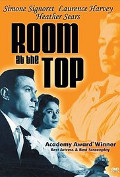
Directed by
Jack Clayton
118 minutes
Rated PG
Reviewed by
Bernard Hemingway


Room At The Top
Arguably the finest of the “kitchen sink” realist films of the late 1950s and early ‘60s such as Look Back In Anger (1959), Saturday Night and Sunday Morning (1960) and The L-Shaped Room (1962) and a classic of British cinema, Room At The Top, whilst sharing with those films the setting of the grim, soulless world of post-war Northern England, stands out from its peers for the breadth of Its moral and emotional reach as it takes us on the shattering journey of an ambitious but essentially weak young man, Joe Lampton (Laurence Harvey), as he sets out to "get ahead", an aspiration captured in the film’s title.
Unlike its peers, the film doesn’t just have a critical agenda,one embodied in Joe’s self-deluding ambition to climb to the top by marrying Susan (Heather Sears), the naive socialite daughter of a wealthy, self-made industrialist (Donald Wolfit), but it is also an exceptionally fine drama as Joe begins an affair with an older woman, Alice (Simone Signoret), the unhappily-married wife of a snobbish Englishman (Allan Cuthbertson). She is the libidinal antithesis of Susan and Joe comes to finds himself genuinely in love with her, but she also represents the end of his ambitions
No doubt John Braine’s iconic novel provided the foundation for the film’s success (screenwriter Neil Paterson won an Oscar for the adaptation) as it tellingly portrays the dispiriting consequences of the English class system and articulates the emotional conflicts involved in Joe and Alice’s affair but it is brought to life by outstanding performances from Harvey and Signoret (who also collected an Oscar), fine cinematography by Freddie Francis (he would also lens Saturday Night and Sunday Morning) and bold direction by Jack Clayton.
Although the initial break-up between Joe and Alice is not particularly well-handled, seeming forced, perhaps intentionally but, if that was its point, not convincingly so, by and large the film unflinchingly captures the socio-spiritual malaise of its setting, the quiet desperation of its characters and the tragedy that befalls them
Want something different?





